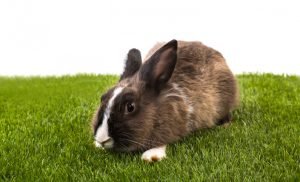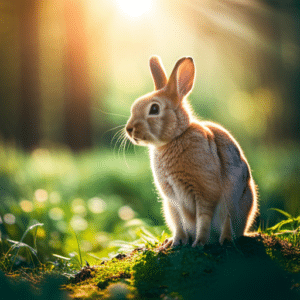Netherland Dwarf Rabbits are a popular breed of bunny due to their small size and cute appearance. These small rabbits have unique care requirements that must be taken into account in order for them to live happy, healthy life. In this blog post, we will discuss all the important aspects of caring for Netherland Dwarf Rabbits, including housing needs, diet information, grooming tips, common health concerns, and more!
Proper Housing for Your Netherland Dwarf Bunny
Netherland Dwarf Rabbits require a spacious and secure living area. You should provide your bunny with a large cage that is big enough for them to move around freely, as well as several safe hiding spots, such as hay or cardboard boxes. The cage should be lined with a soft bedding material like straw or paper towels, which will help them stay comfortable and protect them from cold drafts. Be sure to change the bedding regularly in order to prevent bacteria build-up.
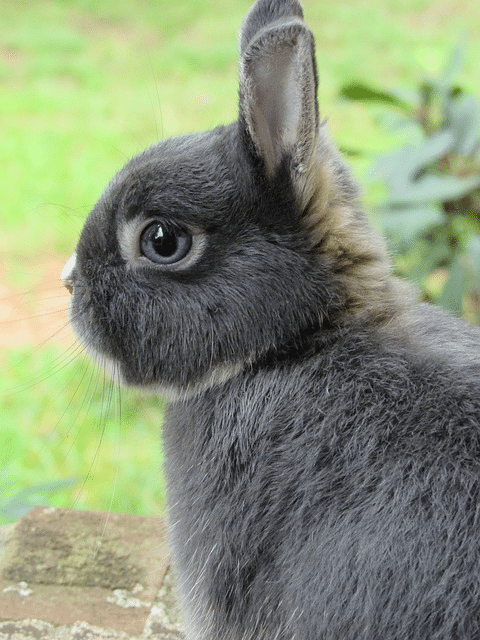
Diet Information
In order to keep your Netherland Dwarf Rabbit healthy, you should feed them a balanced diet of fresh vegetables, leafy greens, hay, and pellets specifically formulated for rabbits. It’s important not to overfeed your bunny, as this can lead to weight problems. Avoid giving your bunny sugary treats and opt for fresh or dried fruits instead. Hay should be available at all times in order to keep their teeth healthy.
Netherland Dwarf Lifespan
Netherland Dwarf Rabbits typically live to be between 4-8 years old, though some can reach up to 10 years. With proper care and nutrition, your Netherland Dwarf Bunny can enjoy a long and healthy life!
Grooming Tips
Netherland Dwarf Rabbits require regular grooming in order to stay clean and free of mats. This small breed tends to need a bit more grooming than some of the larger rabbit breeds due to their high-density fur coat. You should brush your rabbit’s fur once or twice per week with a soft bristle brush, paying close attention to any areas that are prone to matting such as behind the ears and near the tail. You should also trim your bunny’s nails every few weeks using a guillotine-style nail clipper.
Common Health Concerns
Netherland Dwarf Rabbits are prone to several health problems, including dental disease, snuffles (a respiratory infection), and ear mites. It’s important to be aware of these issues and visit your veterinarian if you notice any signs of illness or discomfort in your bunny. Regular veterinary checkups can help catch any potential health concerns early on and allow for prompt treatment if necessary.
Fun Facts About Netherland Dwarfs
Netherland Dwarf Rabbits are relatively new breeds, having been developed in the 1940s from a combination of Polish and Dutch rabbits. They are known for their inquisitive personalities and can even be litter trained! Netherland Dwarfs come in a variety of colors, including black, blue, white, brown, grey, and more.
Feeding a Baby Netherland Dwarf Rabbit (Birth to Four Months)
Baby Netherland Dwarf Rabbits have unique dietary needs. You should provide them with a diet made up of alfalfa hay, pellets specifically designed for baby rabbits, and fresh vegetables like carrots, lettuce, and celery. Avoid giving your bunny sugary treats and opt for fresh or dried fruits instead. You should feed your baby rabbit small amounts of food several times per day in order to ensure they are getting enough nutrients as they grow.
Fun Activities For Your Netherland Dwarf Bunny
Netherland Dwarf Rabbits can benefit from having plenty of fun and enrichment activities to keep them active and engaged. Rabbit-safe toys like cardboard tubes, other chew toys, sticks, or paper bags are great for providing stimulation in their living area. You should also consider setting up a supervised playtime outside of their cage where they can explore and hop around freely (always with your supervision). This will help give them mental and physical exercise while also allowing you two to bond!
Parasite Control and Deworming
Netherland Dwarf Rabbits are also prone to parasites, which can cause a variety of health problems. It’s important to keep your bunny on a regular deworming schedule and take them for vet checkups every six months in order to monitor for any potential parasite issues. Your vet will be able to provide you with the necessary medications or treatments needed in order to keep your bunny healthy.
Care of an Adult Netherland Dwarf Rabbit
Adult Netherland Dwarf Rabbits require daily care and attention in order to stay healthy. Make sure to provide them with plenty of fresh hay and pellets, as well as vegetables and fruits. Check your pet rabbit’s nails every few weeks and brush their fur regularly using a soft bristle brush. You should also keep an eye out for any signs of illness or discomfort so that you can take your bunny to the vet right away if necessary. Lastly, give your bunny plenty of love and attention! They may be small, but they still need lots of affection from you as their owner.
By following these tips, you can ensure that your Netherland Dwarf Rabbit is happy and healthy for years to come!
Ways to Bond With Your Netherland Dwarf Rabbit
Bonding with your Netherland Dwarf Rabbit is an important part of their care. You can bond with them by spending quality time together, such as cuddling or playing simple games like fetch. It’s also important to get your bunny used to being handled frequently so that they don’t become scared or uncomfortable if you have to pick them up for any reason.
You can also bond with your bunny through training and positive reinforcement. Teaching them simple tricks such as sitting on command or coming when called is a great way to strengthen the bond between you and your bunny. Just make sure that you use only positive methods and never punish them for making mistakes – this will help ensure that they remain happy and confident in your presence.
Bonding with a Netherland Dwarf Rabbit can take some time and patience, but it’s an important part of providing them with the loving home they deserve! With care and affection, you’ll form a bond that will last for many years to come.
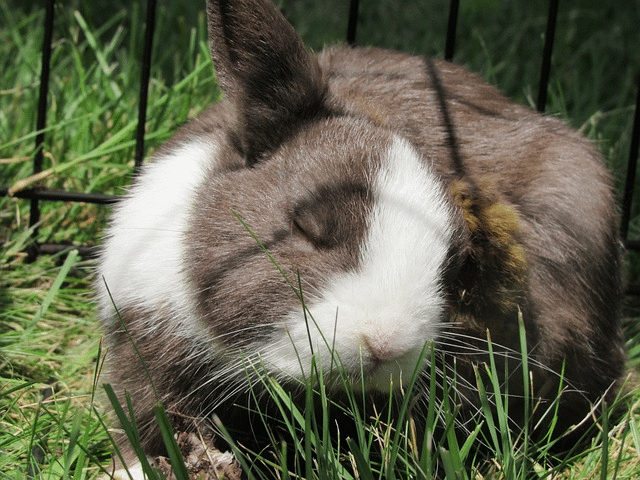
Other Considerations When Owning a Netherland Dwarf Rabbit
When you’re considering getting a Netherland Dwarf Rabbit, there are a few other things to keep in mind. First and foremost, it’s important to make sure that you have the time and resources available to care for them properly – this includes providing them with food, water, exercise, companionship, and veterinary care when needed. Additionally, you should be aware of any local laws or regulations regarding pet ownership in your area before making the commitment to get a bunny. Finally, it’s important to provide your rabbit with an environment that is safe and comfortable – this means providing plenty of space for them to roam around as well as plenty of toys and enrichment activities to keep them happy.
By keeping these considerations in mind, you’ll have a much easier time caring for your Netherland Dwarf Rabbit and providing them with the loving home that they deserve!
9. Making an Educated Decision
Deciding to get a Netherland Dwarf Rabbit can seem like a daunting task, but it doesn’t have to be! By doing your research and understanding the needs of this particular rabbit breed, you can make an educated decision that is best for both you and your bunny. Take some time to consider all of the information listed above before taking the plunge – this will help ensure that everyone involved is ready for the responsibility of owning a Netherland Dwarf Rabbit. Good luck!
How Do You Clean A Netherlands Dwarf Rabbit’s Cage?
Cleaning your Netherland Dwarf Rabbit’s cage is an important part of keeping them healthy and happy. It should be done on a regular basis to keep their environment free from harmful bacteria and to remove any buildup of waste material.
To clean the cage, start by removing your bunny’s fur and all of its accessories such as toys or bedding. Then, use a non-toxic cleaner to wipe down the walls and floors of the cage before disinfecting with a bleach solution (one part bleach to nine parts water). Allow the solution to sit for 10 minutes before wiping it off with a clean cloth. After this, rinse out the entire cage with warm water and dry thoroughly using a towel. Finally, replace your bunny’s bedding, toys, and other accessories before putting them back into their clean cage.
Cleaning your bunny’s cage on a regular basis is essential to their health and well-being – it will keep them from becoming infected with any unpleasant illnesses or parasites that could be caused by an unclean environment. Plus, it helps to ensure that they have a happy and comfortable place to call home!
Dental Care For Your Dwarf Bunny
Dental care is an important part of keeping your Netherland Dwarf Rabbit healthy and happy. A rabbit’s teeth grow continuously throughout their life, so it’s important to keep them trimmed to prevent problems such as overgrown teeth or other dental diseases.
Luckily, there are a few simple steps you can take at home to ensure that your bunny’s teeth stay in tip-top condition! First, make sure that they have plenty of hay available on a daily basis – this will help keep their teeth worn down naturally. Additionally, providing wooden chews or other hard treats can help exercise their jaw muscles and reduce the risk of tooth overgrowth. Finally, you should check your bunny’s mouth regularly for any signs of infection or overgrown teeth.
If you notice any problems with your bunny’s teeth, it’s important to take them to the vet for treatment as soon as possible. With regular care and maintenance o your dwarf rabbit caret teeth, you can help your Netherland Dwarf Rabbit stay healthy and happy for many years to come!
e!
Nutritional Needs Of Your Dwarf Rabbit
The nutritional needs of your Netherland Dwarf Rabbit are just as important as their dental care when it comes to keeping them happy and healthy. A balanced diet is essential for rabbits, so it’s important that they have access to plenty of fresh hay, vegetables, fruits, pellets, and other treats on a daily basis. Hay should be the main component of their diet and should be available at all times – it helps to keep their digestive system healthy and also provides essential vitamins and minerals.
Vegetables, fruits, and other treats should be provided in moderation – typically around a handful per day for an average-sized rabbit. Pellets can also provide additional nutrition but should only be given in small amounts since they are high in carbohydrates.
Finally, fresh water should always be available to your bunny – clean it on a daily basis to make sure that it’s free from bacteria or harmful contaminants. By providing the proper nutrition for your Netherland Dwarf Rabbit, you can help ensure that they stay happy and healthy for many years to come!
Do You Need A Heater Inside A Netherlands Dwarf Rabbit’s Cage?
When it comes to caring for your Netherland Dwarf Rabbit, one of the most important things you need to consider is whether or not a heater should be placed inside the cage. Depending on where you live, temperatures can vary drastically so it’s important to make sure that your bunny’s environment remains comfortable all year round.
In general, rabbits are quite resilient and can tolerate lower temperatures as long as they have access to plenty of hay bedding to keep them warm. However, if temperatures drop below freezing in your area then using a heater may be necessary. An electric heating pad placed under the bedding is usually enough to keep your bunny nice and comfortable during the colder months. Additionally, some cages come with built-in heating systems that are designed specifically for rabbits.
Do Netherlands Dwarfs Make Good Pets?
Netherland Dwarf Rabbits can make wonderful pets for both experienced and new rabbit owners alike. They are generally quite friendly and affectionate, and they love to explore their surroundings, making them an ideal choice for many pet owners, families with children, or those who want a companion to keep them company.
However, like any pet, it’s important to do your research before committing to owning a Netherland Dwarf Rabbit. Make sure you’re prepared with the proper supplies such as a cage, bedding, food, hay, treats, toys, and other essentials before bringing your furry friend home! Additionally, be sure to provide plenty of socialization opportunities so that your bunny can develop bonds with family members as well as other rabbits. With some care and attention, your Netherland Dwarf Rabbit can become a beloved member of your family!
Can You Put The Cage Of Netherlands Dwarfs Near Other Breeds?
It’s important to note that Netherland Dwarf Rabbits are much smaller than other rabbit breeds, so it’s best not to place their cage near larger rabbits. These small bunnies can easily become prey in the presence of larger animals, so it’s important to keep them separate whenever possible. Additionally, larger rabbits and other rabbit breeds may also bully or intimidate your Netherland Dwarf Rabbit if they are placed too close together.
Instead, you should provide plenty of space for each bunny and make sure they have enough toys and activities to keep them entertained while separated from one another. This will help ensure that both breeds remain safe and secure while living in the same household!
Rabbits Grinding Their Teeth – What Does It Mean?
Rabbits grind their teeth to indicate contentment and happiness. This behavior is also known as “bruxing”, which is the act of grinding, gnashing, or chattering one’s teeth. If you hear your Netherland Dwarf Rabbit making this sound while sleeping or lounging around, it likely means that they are feeling relaxed and safe in its environment!
It’s important to note that over-grinding can be a sign of stress or pain so if you notice your bunny bruxing excessively then it may be time to visit the vet for a check-up. Additionally, if other signs of discomfort are present such as trembling or restlessness then you should be sure to take your bunny to the vet immediately.
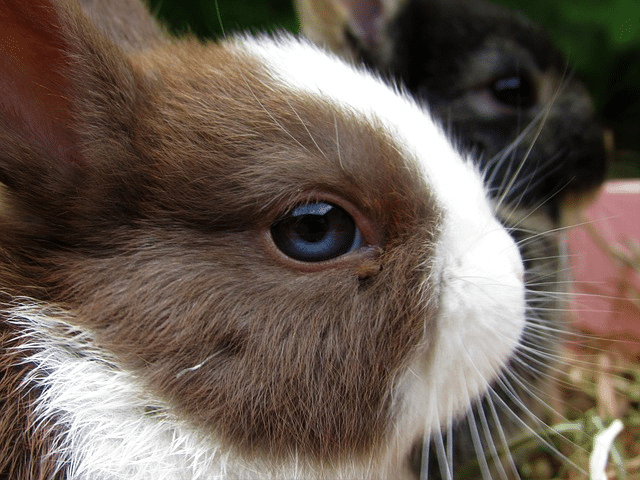
Do Netherlands Dwarf Rabbits Eat Fruits And Vegetables?
Yes, Netherland Dwarf Rabbits can and should be given a variety of fruits and vegetables as part of their diets. Fruits such as apples, bananas, pears, strawberries, and blueberries are great sources of fiber and vitamins that your bunny will love! Additionally, vegetables like carrots, broccoli, spinach, kale, and bell peppers provide essential nutrients and minerals.
It’s important to note that fresh food should only make up about 10-20% of your rabbit’s diet so it should not replace the hay or pellets you give them each day. Additionally, some fruits contain sugar which can be unhealthy in large quantities so if you are going to feed these treats to your Bunny then please do so in moderation!
Where Do You Place A Netherlands Dwarf Rabbit’s Cage, Indoors Or Outdoors?
Netherland Dwarf Rabbits should always be housed indoors. These small bunnies are particularly sensitive to temperature changes and can easily become ill if kept outside for too long. Additionally, they are also quite social animals and thrive on human interaction, so it’s important to keep them close in order to give them plenty of love and attention.
When choosing a spot for your rabbit’s cage, make sure that it is away from direct sunlight or drafts as both of these can be detrimental to their health. Additionally, most pet rabbits will prefer calm environments so try to place the cage in a quiet corner of the house where there won’t be too much commotion or noise. With some care and dedication, you can create a safe and comfortable home for your Netherland Dwarf Rabbit!
t!
Can Netherland Dwarfs Escape Their Cages?
Yes, Netherland Dwarfs are known for their escape abilities. They are active and nimble creatures that can easily squeeze through small spaces or jump over obstacles in order to make their way out of a cage. If you want to ensure that your bunny won’t get out, then you need to make sure that all access points into the cage are secure and closed tight at all times. Additionally, it is also important to supervise your dwarf rabbit care well while they are outside of the cage so as to prevent any unexpected escapes!
Can You Prevent A Netherland Dwarf Rabbit From Eating His Droppings?
Yes, it is possible to prevent your Netherland Dwarf Rabbit from eating their droppings. The first step is to make sure that there are plenty of hay and other fiber-rich treats available so that your bunny can stay full and not feel the need to snack on its own droppings. Additionally, you should also place any waste in a separate area away from your rabbit’s living space as this can help deter them from snacking on it. Finally, keep an eye out for any signs of unusual behavior and pay close attention if your bunny starts exhibiting signs of boredom or anxiety as these can be triggers for coprophagia (eating one’s own feces). With careful observation, you can help ensure that your Netherland Dwarf Rabbit stays healthy and happy!
Can Netherlands Dwarf Rabbits Get Along With Other Pets?
Yes, Netherland Dwarfs can get along with other pets provided they all have the right introductions. Before placing two rabbits together in the same cage it is important to ensure that they are both spayed or neutered so as to reduce any chances of territorial behavior. Additionally, it’s also a good idea to have other pets and introduce rabbit pets to them slowly by putting them in separate cages next to each other and allowing them time to get used to one another before they are placed in the same space. With patience and dedication, you should be able to create a harmonious home for your Netherland Dwarf Rabbits!
How Often Should A Netherland Dwarf Rabbit Be Groomed?
Netherland Dwarf Rabbits should be groomed once or twice a week in order to keep their fur healthy and free of debris or dirt. Additionally, it is also important to regularly check for any lumps, bumps, or other lesions as these could be signs of infection or illness. During each grooming session, make sure to brush its coat gently and carefully so as not to cause any irritation or pain. With regular brushing and grooming, your Netherland Dwarf Rabbit will stay looking fabulous!

Can Netherland Dwarfs Live Outside?
No, Netherland Dwarfs should not live outside as they are not equipped to handle the cold temperatures and other harsh elements of nature. They have delicate bodies and thin fur that does not provide enough protection from extreme weather conditions. Additionally, wild predators can also pose a threat to their safety so it is best to keep them inside where they will be safe and secure. With proper care and attention, you can create a cozy home for your Netherland Dwarf Rabbit!
Use An Appropriate Feeder And Waterer
It is important to use an appropriate feeder and waterer for your Netherland Dwarf Rabbit. While these rabbits can easily tip over traditional bowls, there are also specially designed feeders and waterers that are weighted down or have a lip at the edge so as to prevent them from being overturned. Additionally, make sure to check their food and water levels regularly and clean out any debris or dirt before refilling them with fresh supplies. With a little bit of effort, you can help ensure that your Netherland Dwarf Rabbit pet’s meals always stay safe and secure!
Do Netherland Dwarf Rabbits Have Good Hearing?
Yes, Netherland Dwarfs have very good hearing and can detect even the faintest noises. This is why it’s important to create a calm and peaceful environment for your rabbit as loud, sudden noises could startle them and cause distress. Additionally, you should also be aware of any signs of respiratory problems or other illnesses as these can interfere with their hearing abilities. With careful monitoring and proper healthcare, you can ensure that your Netherland Dwarf Rabbit stays healthy and happy!
Do Netherland Dwarfs Do Well In Pairs?
Netherland Dwarfs do quite well when paired with other rabbit breeds, provided they are both spayed or neutered and have been given the proper introductions. When housed together, it is important to ensure that there is always plenty of space for them to move around as well as a variety of toys and activities for them to enjoy. Additionally, make sure to check on them regularly in order to monitor their relationships and intervene if necessary. With patience and dedication, you can create a wonderful home for your Netherland Dwarf Rabbit pair!
Can Netherland Dwarfs Be Trained?
Yes, Netherland Dwarfs can be trained with patience and consistency. Positive reinforcement techniques such as clicker training or
Can Pet Rabbits Tolerate Children?
Yes, Netherland Dwarf Rabbits can generally tolerate children if they are supervised and handled with care. It is important to make sure that the child knows how to properly hold and interact with the rabbit in order for them both to have a positive experience. Additionally, always be mindful of any signs of distress from either the child or the rabbit as this could indicate an uncomfortable situation. With proper guidance and supervision, you can help create a happy home for your Netherland Dwarf Rabbit and your family!
In Conclusion
Netherland Dwarfs are an incredibly sweet and social breed of rabbit that make great pets. They require a safe, comfortable home with plenty of space to move around as well as access to fresh food and water. Additionally, they can be trained using positive reinforcement techniques such as clicker training or treats. With proper care and attention from their owners, Netherland Dwarf Rabbits can live happy lives in the comfort of their own homes and even tolerate children when supervised properly! Taking all these things into consideration should help you provide your furry friend with the best life possible!

